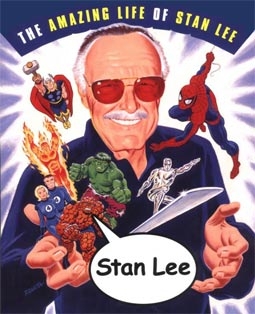
I recently had the pleasure of speaking with legendary storyteller, Stan Lee for a humorous and endearing journey through his life and prolific career. Stan Lee put Marvel Comics on the map with such iconic superheroes as Spider-Man, The Fantastic Four, The Hulk, and X-Men which have all gone on to big screen glory in recent years. Spider-Man 1 & 2 enjoyed two of the biggest openings in movie box office history. The films, starring Stan Lee's famous Spider-Man character, paid homage to Lee with both scripts being based on the Spider-Man stories and comics that Lee had penned during his heyday with Marvel Comics. At this point, his name is synonymous with the term "movie franchise" with X-Men, Fantastic Four and Spider-Man franchises all going strong. Stan Lee is a living legend, having created characters that are so deeply woven into our cultural tapestry, he can only be likened to that of a living Walt Disney.
The past several years have undoubtedly proven Lee's iconic characters to equal box office gold for movie studios. Now Stan Lee himself has gone on to create his own film and television production company, POW! Entertainment. P-O-W stands for "Purveyors of Wonder." According to Lee and POW! Entertainment CEO, Gill Champion, the best is yet to come from Stan Lee's imaginative mind. The new crop of characters and storylines being developed (approximately forty projects and counting) will blow fans away and usher in a new era for Stan Lee, as head of his own production company. POW! is proving to be a formidable force in Hollywood, attracting the interest of "A-Listers" in every creative arena. POW! Entertainment will produce both animation and live action projects for television, film, DVDs, video games and an emerging medium of cell phone downloadable episodic stories. Now in their fourth year with POW!, Stan Lee, award winning producer Gill Champion and third partner, intellectual property specialist Arthur Lieberman, Esq. are excited to have built a stable of strong alliances with the likes of Ringo Starr, Michelle Rodriguez (ABC's smash hit series, Lost), Hugh Hefner, producer Robert Evans (How to Lose a Guy in 10 Days, The Godfather, Chinatown, The Cotton Club, Sliver, Urban Cowboy, Rosemary's Baby), Paramount Pictures, The Sci-fi Channel … the list is endless!
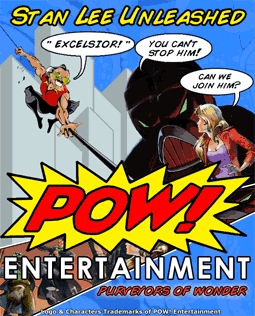
With an entrepreneurial spirit and the goal of giving their writers and fans true stake in their company, they have decided to take POW! Entertainment public (Symbol: POWN). "There were a lot of fans, both domestically and internationally, that had an interest in the company. And we said, 'you know what, if it was a public company maybe there's a chance for some of these people to participate in a small way.' That's been a part of the fun of doing it. Also going public would give us a chance to hire some of the writers we wanted to hire and give them a stake, not only in individual projects, but also a stake in the company," states POW! CEO Gill Champion. Champion also shared that the company hopes to establish full branding and franchises that encompass merchandising and other licensing of their characters and intellectual properties.
"If you're going to be in the entertainment [industry], why not be with a guy who is batting a thousand," Champion says, in summing up his decision to join forces with business partner, Stan Lee. "We think it's a smart investment… to bring the funding and marry that together with Stan's story telling." As far as inking a deal with a major studio versus remaining independent, Gill Champion says, "That's an ongoing discussion and we're looking at the advantages and the disadvantages. What we're doing now is, Stan comes up with the majority of the ideas. We then either attach writers, directors, actors or other elements and then go to the different strategic partners, or to movie studios, networks or video game companies." POW! Entertainment generates about 85% of their properties in-house, with a small percentage coming from outside established talent.
In this interview with Stan Lee, I witness a man who is clearly in his prime, not just professionally, but personally. He is happy, relaxed and has a sharp sarcastic wit that made our conversation feel like a well timed tennis match. Some of his tongue-in-cheek answers flew right over my head until the delayed reaction would boomerang back and hit me, a good 5 minutes later, only to leave him cracking up at my gullibility. This became an ongoing joke throughout our interview, until I finally caught on to the Stan Lee brand of deadpan humor. We discuss everything from his childhood, to his early career to his new endeavors with POW! Entertainment. He was brimming with excitement over new television and film projects coming out this year. Stan is so warm and funny, and his verbal storytelling skills are every bit as intriguing as his written stories.
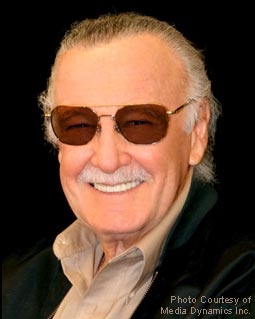
Stan Lee: Allison, are you there? This is Stan Lee!
PR.com: (Allison Kugel): Hi Stan! It's an honor to be speaking with you.
Stan Lee: Well thank you very much.
PR.com: I want to start by talking about your early
life because…
Stan Lee: I was born of poor, but humble parents. (Laughs)
PR.com: I thought for a minute that you were going to quote Steve Martin's character in The Jerk…
Stan Lee: So tell me… what would you like to know?
PR.com: What childhood influences set the pattern for who you became as an adult?
Stan Lee: Oh I guess like everybody else, the things I read and the movies I saw, and of course whatever my parents taught me. But the biggest influences I think were the movies and the books.
PR.com: So you were definitely a movie fan when you were a child?
Stan Lee: Oh, was I ever! In those days, I could only go to about one movie a month, just because of the price. It was a big event when I would go to a movie. Luckily, I could read a book at any time, so I did a lot of that.
PR.com: Where did your creative inspiration come from when you were growing up? Did you have a favorite superhero, a favorite movie star, or a favorite author?
Stan Lee: My favorite movie star, far and away, was Errol Flynn. I thought that this guy was the greatest because he always played such heroic roles. He was either the sheriff of Dodge City, or he was Robin Hood, or he was Captain Blood. When I would leave the theater, I'd be about 10 years old I guess… I would imagine I had a little crooked smile on my face the way Errol Flynn did, and an imaginary sword at my side. I'd be looking around for little girls that might be [attacked] by some bullies.
PR.com: Laughs.
Stan Lee: So, I'd run in and defend them. I wanted to be Errol Flynn so badly.
PR.com: Do you have one specific memory where it clicked in your mind that you wanted to write characters?
Stan Lee: No. What happened was, at school I was always good at [English] composition. Whenever I had to write a composition, I did well and the teachers always encouraged me to write. It came easy to me. So, it was very nice to be encouraged to do something that came easily.
PR.com: And who was the first person who believed in your talent, when you got out of school and you started to make your way in your career?
Stan Lee: Well that's an interesting question. I was hired at a magazine company just to be an assistant. It was a comic book company… to the editor and the artist. They worked together. And after I was there for a while, they started giving me things to write. So I guess you might say that they were the first. Their names were Joe Simon and Jack Kirby.
PR.com: Was this where you had a distant relative who owned the company and it began there? (The company that later became Marvel Comics.)
Stan Lee: Yeah, he was my cousin's husband. It was never a close relationship, but I had heard that they had an opening there and were looking for an assistant. I didn't even know it was in the comic book department. So I thought that I was applying to go in the magazine department, and then they had the opening in the comic book department. I had never thought I'd be doing comics. I figured… in those days comics were really not highly respected by the outside world. So I figured I'd stay there for a few months and get some experience, and then I would try to get into the other departments which were more, I thought, legitimate.
PR.com: Right.
Stan Lee: But I somehow seemed to stay in the comics all those years.
PR.com: So you started coming up with stories and Jack Kirby was the person who illustrated them?
Stan Lee: Yeah. Jack [Kirby] and Joe [Simon] wrote and drew the stories themselves in the beginning and I was just, like, the office boy. But after a while they had more writing than they could handle and I was the only guy around, so they said, "Hey Stan, you think you can write this?" When you're seventeen years old, what do you know? I said, "Sure, I can do it!" And that was it.
PR.com: Sometimes ignorance is bliss, right?
Stan Lee: I'm afraid so.
PR.com: (Laughs) Tell me about the Stan Lee creative process. What is your routine or pattern for coming up with a new character and writing a story? And are you more successful when you designate a time to sit down and write, or is it better when it just comes to you when you're doing something else?
Stan Lee: To tell you the truth, I think I'm probably the quintessential hack writer. I don't get inspirations as such. And when I don't have something to write, I'm not thinking about it at all. But, I'm sort of a pressure writer. If somebody says, "Stan, write something," and I have to have it by tomorrow morning, I'll just sit down and I'll write it. It always seems to come to me. But I'm better doing a rushed job because if it isn't something that's due quickly, I won't work on it until it becomes almost an emergency and then I'll do it.
PR.com: So you're a last minute procrastinator…
Stan Lee: With writing, yeah. Mainly because it's always been something I didn't have to worry about. I knew I could always do it; why waste time doing it when I could be watching television or reading a book or going for a walk?
PR.com: People will hate you for that, the fact that your talent just comes to you, on demand.
Stan Lee: It's the only, the luckiest thing about me, that I've never had what you might call "writer's block."
PR.com: I was going to ask you about that. Did you ever have writer's block, even once?
Stan Lee: No. If I have to write something, I think of it and I write it.
PR.com: That's amazing. Ok, I'm going to test your memory here. Do you happen to remember exactly where you were and what you were doing when you thought up the idea for Spider-Man?
Stan Lee: You know, it's a funny thing. I have told this story so often…
PR.com: I can imagine…
Stan Lee: And for all I know, it may even be true…
PR.com: Laughs.
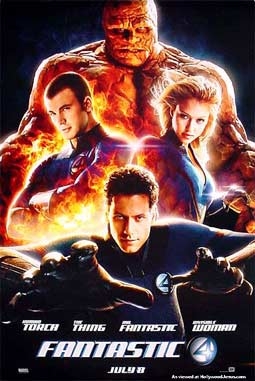
Stan Lee: (Laughs) …I had already done The Fantastic Four and I had done, I believe it was The Hulk, and they were doing pretty well. My publisher said, "How about dreaming up another superhero?" So I said, "Okay." I was sitting at my desk trying to think of one and I saw a fly crawling on a wall, and I said "Gee, wouldn't it be cool if I could get a hero who could crawl on walls like an insect?" But I think I'm not telling you the truth, because I couldn't have said, "Wouldn't it be cool," because that word wasn't in common usage back then. So I probably said, "Wouldn't it be groovy?"
PR.com: You're funny.
Stan Lee: I wouldn't want to lie to you.
PR.com: (Laughs) Thank you.
Stan Lee: At any rate, you see, when you do a new superhero the biggest problem in the beginning is what super power do you give him? They've all been taken! (Laughs) But the idea of somebody who could stick to walls like an insect, I thought that was original. So then I needed a name for him. I figured, how about Insect-Man? And that didn't sound dramatic. Mosquito-Man? Nah. I went down the list. And when I got to Spider- Man, somehow it sounded dramatic. Spider-Man! So, I had my name. Because he was called Spider-Man… I was working with an artist, Steve Ditko, and we decided, hey why shouldn't he shoot webs also?? That's how it happened.
PR.com: So then you described exactly what you saw in your mind's eye and he drew it?
Stan Lee: First I gave it to Jack Kirby to do, but Jack always drew these very heroic characters, like Captain America. I said to him, "You know Jack, I want this fellow Peter Parker, I want him to be just an average teenager. Don't let him look like your typical muscular superhero." I guess Jack was so used to drawing those kinds of people, that after he drew a page or two I looked at it and I said, "No, that's not right." So I said, "Forget it Jack. I'll give it to another artist." And Jack didn't care; he had a lot of other things to do, and we didn't realize this was going to become such a big script. So I gave it to Steve Ditko, who tended to draw things a little more realistically and more down to earth. And he did it, and I really don't interfere much in what the costume will look like. Steve pretty much invented the [Spider-Man] costume himself.
PR.com: Did Jack Kirby feel like he missed the boat when the character went on to become so successful?
Stan Lee: Well, we never discussed it. But Jack did so many other successful things; I don't think it was ever anything that ever bothered him.
PR.com: Could you ever have imagined that Spider-Man 1 and Spider-Man 2 would go on to be two of the biggest box office openers of all time? (As of the date of this article, Spider-Man 1, biggest opening weekend; Spider-Man 2, biggest opening Wednesday.)
Stan Lee: I imagined it when the movies were being made, because I realized how well they were being made. But in the early days, when we were doing the books, I never thought that Spider-Man would become the world wide icon that he is. I just hoped the books would sell and I'd keep my job.
PR.com: You certainly kept your job! Why are these stories that you wrote all coming to the screen now? Fantastic Four, Spider-Man, X-Men, Daredevil, Hulk… everything has come to the screen in the last couple of years. Why now?
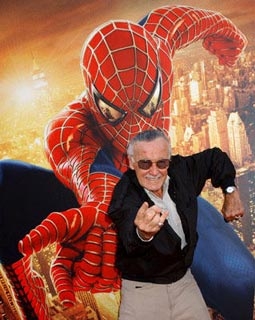
Stan Lee: One reason is that a new group took over [Marvel], and they were dedicated to doing these movies. In the past, the people running Marvel really weren't making any great effort to do motion pictures of the characters. The second reason is the fact that the technology had evolved to the point where the special effects could be done so magnificently now. Spider-Man couldn't have been done as well as it was, 10 years ago. They couldn't have had him swinging on the web the way he did, and so forth. And the reason that so many of the comic book superheroes are coming to the screen is simply because now they're able to do it, and they weren't able to before.
PR.com: You're right. I never thought of that. In the movie Hulk, the animation was so real, so detailed. They could not have done that probably even 7 or 8 years ago.
Stan Lee: Absolutely right. It all started, I think, when Superman first came out and the ad said: "You will believe a man can fly." You remember?
PR.com: Oh, when the first Superman came out? Oh gosh, I think I was really little. (Laughs) Sorry.
Stan Lee: Well I remember Noah's Ark. I keep forgetting (Laughs).
PR.com: Laughs.
Stan Lee: That was the start of it. But even then, they couldn't have done what they do now with a movie like Spider-Man or X-Men or The Hulk.
PR.com: And you co-wrote all three Spider-Man scripts. Is that correct?
Stan Lee: No. What happened was Spider-Man 1 and 2, the screenplays were taken… I'd say Spider-Man 1 about 95% of it was based on the stories I had written, and Spider-Man 2, about 90% was based on stories I had written. I don't actually write screenplays. That's probably the reason that they credited me that way.
PR.com: For Spider-Man 3, did they make up their own original story?
Stan Lee: Well they're using characters from the books, but I think it's going to be… they're taking bits from a lot of different books. I haven't read the script myself, so I only know what I've heard.
PR.com: And have you been involved at all on set for any of these movies?
Stan Lee: I do my thing and they do their thing. The only time I go on the set is when I have a cameo to do in the picture. I go to the set and I do my little cameo and I meet all the people. It's a great way to spend the day. And then I go back to my own world.
PR.com: How did that tradition start, with you making a cameo appearance in every movie?
Stan Lee: I think it started with Spider-Man 1. No, with the X-Men. It was in the first X-Men movie. There was this scene on the beach, and they had me selling hotdogs in the background while something went on. You only saw me on the screen for a couple of seconds. But being the perfectionist that I am, I kept saying to the director, Bryan Singer, "What is my motivation? Should this hot dog that I'm trying to sell have mustard and sauerkraut?" (He breaks up laughing) …
PR.com: … "Is it kosher, or isn't it?" (Laughs)
Stan Lee: … "Is it rare?"… I mean, I really care about these things. (Laughs)
PR.com: Right.
Stan Lee: Crazy, but it's a lot of fun. And then, I did something in the Spider-Man movie, and then I have a role in X-Men 3. My biggest role was in The Fantastic Four. I had a whole line to say.
PR.com: I saw The Fantastic Four about two or three nights ago. Were you the mailman?
Stan Lee: Yes.
PR.com: You were the mailman! I knew it!!
Stan Lee: That was the key scene in the whole movie. (Joking) The whole movie, obviously, revolved around the fact that they meet me and I have a line to say to them. Without that scene, you had no movie. (Laughs)
PR.com: Exactly. (Laughs) Out of all of the actors who have portrayed your characters, which actor do you think portrayed their character closest to how you envisioned it when you wrote it?
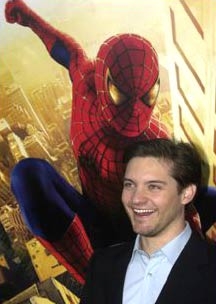
Stan Lee: That's an impossible question, because they are all so good. Tobey Maguire was just perfect as Spider-Man. And I think that the fellow who plays Professor X in the X-Men... Patrick Stewart… I mean, they are all wonderful. I can't say which one is the best.
PR.com: You talked a little earlier in the conversation about how you like for the characters that you write, or the superheroes that you've created, to be just as flawed as they are powerful?
Stan Lee: Well I think if they're not flawed, they become incredibly uninteresting, because they become one dimensional. If the character can do no wrong and is perfect in every way, he is not a terribly interesting character. So, I've always tried to make the characters I've written as realistic as possible and then just give them one attribute that makes them incredibly colorful so you want to read about them. But beyond that attribute, they should be as realistic and empathetic as possible.
PR.com: Do you think that being a powerful person makes somebody more vulnerable in some ways?
Stan Lee: No. Not unless the writer inserts it. As an example, Superman never had that vulnerability. And I think it's one of the reasons that Spider-Man almost always outsold Superman. It was a little difficult to worry about Superman when you were reading the stories because you knew nothing could hurt him. And that's why they finally had to invent Krypton later on. The writers realized what a problem it was to get any reader to really feel there's any suspense to the stories. So, it's not that when you're powerful you have to have vulnerability. It's that if you're writing about a character, if he's a powerful character, unless you give him vulnerability I don't think he'll be as interesting to the reader.
PR.com: Right, because more people can relate to somebody like Peter Parker (Spider-Man's alter ego).
Stan Lee: Of course. Achilles, without his heel, you wouldn't even know his name today.
PR. com: Do you write parts of yourself into any of your characters?
Stan Lee: Into every one! I don't think any writer can help but do that. Don't forget, when you give them dialogue to say, where is the dialogue coming from? It's coming from your own head.
PR.com: Right, and your own experiences.
Stan Lee: Yeah. So if I have a hero say something, I am thinking to myself, "What would I say if I were him in that particular situation?" If I have a villain say something, when I'm writing his dialogue, I become the villain. I'm putting myself in that spot and I'm thinking, "What would I say?" I haven't spoken to every other writer in the world, but I would imagine most writers have the same attitude. I mean, you can only write a character well if you think you're that character at the moment; if you can be that character in your mind. (Pauses) I think I explained that beautifully.
PR.com: You did very well. (Laughs)
Stan Lee: I tell ya… I'm impressing the hell out of myself.
PR.com: You're on fire. (We laugh) I have one more question that goes along with that…
Stan Lee: We have to stop?
PR.com: No, no, no! I have plenty more, are you kidding?! Can you give me one particular example of a famous line from one of the characters that you've written, which was very much a part of you or something that was very personal?
Stan Lee: "With great power comes great responsibility." (From Spider-Man) And then there was another one… I think it was a Silver Surfer story, where somebody is talking about the most powerful person in the world. The Silver Surfer says, "There is only one who is all powerful, and his greatest weapon is love." I wrote it a little better than that. I can't recall it word for word. And when I used to lecture in colleges, a lot of students would always bring that up and say they were very impressed by it. Love, or a good feeling toward your fellow man, I think will accomplish more than anything else. Certainly more than hatred or violence or anything of that sort.
PR.com: Now let's talk about your company. What prompted your decision to leave Marvel and to form POW! Entertainment after all of these years?
Stan Lee: Believe it or not, I have never left Marvel. I'm still the Chairman Emeritus. Although, as you know, that's mostly an honorary title. But I still write the Spider-Man newspaper script and I still do as much publicity for Marvel as I can. But I have a clause in my contract that says that I can also do other things. And since I feel I've written enough comics now, I've been at it for half a century, I thought it would be fun to start my own company and do movies and television and DVD's and things like that.
PR.com: And why did you wait until this point in life, rather than starting your company 10 or 20 years ago?
Stan Lee: Because I was too busy working for Marvel. When I work at something, I throw myself into it fully. But when Marvel started doing the movies, they brought in a bunch of other people who were movie experts and there wasn't as much for me to do. I didn't want to just occupy an office. [It was] time for me to move on.
PR.com: And now with POW! Entertainment, you have 40 original projects that are currently in development?
Stan Lee: Well I haven't counted them but I think that's a good guess. Yeah, we have any number of things that are in some process or some stage of development or production.
PR.com: And this has nothing to do with comics, they're being produced strictly for television and for film?
Stan Lee: That's right. Television, films, DVD's, telephone-mobisodes (mini episodic television for mobile phones). Some of them may end up also being comic books. Very often a movie producer will say, "Can we do a comic book to promote this prospective movie?" or something like that. And certainly there's no reason not to do comics, but basically we're a film and animation company.
PR.com: How did you and your partner at POW! Entertainment, Gill Champion, join forces?
Stan Lee: Well I had known Gill for about 6 or 7 years now, and he has a tremendous background. He's been a producer, a casting director; he's been involved in almost every facet of movie production. He's also a hell of a good editor. I wrote some copy yesterday which I thought was absolutely perfect. I showed it to him and he made two suggestions, and I hated him for it because they were good suggestions. So I made the change. [He's a] good guy to work with. We have a third partner named Arthur Lieberman, who's an attorney. Gill handles the every day running of the business, Arthur handles all the contractual work, and anything that's left over, I do.
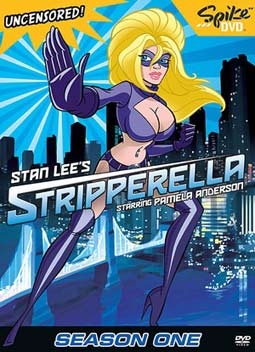
PR.com: When you did the animated series, Stripperella with Pamela Anderson, Gill was involved in that as well?
Stan Lee: Oh sure.
PR.com: And was that through Marvel or through POW! Entertainment?
Stan Lee: That was POW! Entertainment.
PR.com: And when did POW! Entertainment officially launch?
Stan Lee: About four years ago.
PR.com: Let's talk about some of the new projects. You have a film coming out called Foreverman?
Stan Lee: Yes. We're doing that at Paramount and it's in development at the moment.
PR.com: And that's going to be a live action feature film?
Stan Lee: Oh yes indeed.
PR.com: Is that a new superhero, Foreverman?
Stan Lee: You might say so, yeah.
PR.com: Can you tell me about the character?
Stan Lee: He's a policeman, but it's in the future, some years in the future. He has a very unusual mission - a suicide mission to rescue somebody who can't be rescued, but he has to rescue them. I can't tell you any more than that because it has a lot of angles that haven't been done before and I don't want to give them away.
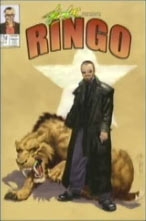
PR.com: And you're also doing something with Ringo Starr?
Stan Lee: Yes, I told him I would do my best to make him famous.
PR.com: (Laughs) Good luck with that.
Stan Lee: It will be an animated DVD starring Ringo Starr. We're going to make him a superhero, but an unusual type of superhero. And he, of course, will do his own voice and he'll do the music.
PR.com: Is he going to be a rock star superhero?
Stan Lee: I can't tell you that because that would give it away.
PR.com: And then you're doing a project with Hugh Hefner and Playboy called Hef's Super Bunnies?
Stan Lee: Another guy that I said, "I think I can do something for you, Hef. It's about time the world…"
PR.com: … "It's about time you got noticed." (Laughs)
Stan Lee: That's right! (Laughs) We're making him a superhero too. (Continuing his tongue-in-cheek dialogue with Hugh Hefner) "See what we're doing is, we're going to tell the world the truth about you, Hefner. Everybody thinks of you as a pleasure seeking, hedonistic, sybaritic type of character. You know, interested in partying and women. But they don't know the real you, Hef."
PR.com: Is that what you said to him?
Stan Lee: He's devoting most of his time and most of his life, risking his life, trying to protect America and getting no credit for it. I mean, it's a real tear jerker. (Laughs)
PR.com: Laughs.
Stan Lee: It'll be a cartoon and I bet it's going to be very funny.
PR.com: Is he lending his voice to the cartoon?
Stan Lee: I don't know whether he'll do his voice or we'll have an actor doing it. I'm going to ask him which he prefers. We haven't discussed that yet.
PR.com: So it's Hugh Hefner, and he has crime fighting Playmates of the Month, right?
Stan Lee: (Laughs) You're coming very close…
PR.com: But you can't give it away…
Stan Lee: No, you see, it's a whole secret organization. The Playboy Mansion is the front for one of the greatest crime fighting organizations on the face of the earth.
PR.com: You know how people form conspiracy theories where they actually believe that something really is the case? People might start to think that this really is the case…
Stan Lee: Well wait a minute, wait a minute... you don't think what I'm telling you is fiction?!
PR.com: (Laughs) You mean Playboy Magazine, The Playboy Mansion… everything is just a front for a covert crime fighting operation?
Stan Lee: Well, I have a reputation girl! I couldn't write anything that isn't so!
(He's joking of course. Or is he??)
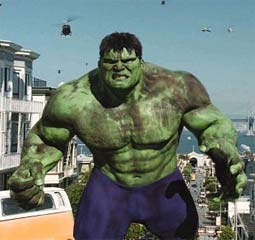
PR.com: You're now 83 years old. Most people are retired by that age, and here you are, starting a new company and you have 40 projects in the pipeline. What motivates you to keep creating and to keep working?
Stan Lee: Well, first of all, it's probably because I'm really an early model 83. (Laughs) I enjoy what I do. If I were a golfer and I were 83 years old and you found out that I'm on the golf course everyday, you wouldn't say, "Well, what are you doing that for?" You'd figure that would be natural.
PR.com: You're right.
Stan Lee: Well, I enjoy making up stories. I enjoy working with the people I work with; they're all friends. I enjoy everything I'm doing, so I'd be crazy to stop. Most people when they retire, the reason they retire is they say, "I can finally stop working and now I can do what I've always wanted to do."
PR.com: Right, and "I can now enjoy my life…"
Stan Lee: Yeah, "I can do the things I like. I can fish, or play golf, or travel or whatever." If I retired, I would try to do what I'm doing now.
PR.com: So you're one of the few fortunate people who love what they do, and if you love what you do, why would you want to stop?
Stan Lee: I could not have said it as well as you did.
PR.com: Well that's a blessing, because from my experience, most people don't love what they do.
Stan Lee: It's a shame, and I'm aware of that. I've even written stories about that.
PR.com: I mean, I love doing this. I love speaking with interesting and accomplished people. I think it's just a great gift to be able to speak with someone like you, first hand, and…
Stan Lee: I know. I envy you, I really do.
PR.com: I envy you! We envy each other.
Stan Lee: It's very nice of you and I appreciate that.
PR.com: Are you a very adventurous person in your own life, or do you tend to live vicariously through the characters that you create?
Stan Lee: That's a good question. Nobody's ever asked me that and I've never thought about it. I'm afraid I'm not all that adventurous, personally. I get the adventure out of my system by trying to write things that haven't been written before, coming up with new ideas, if I can. And that's about as much adventure as I think I need.
PR.com: So your adventure is using your imagination…
Stan Lee: I'd say so, yeah.
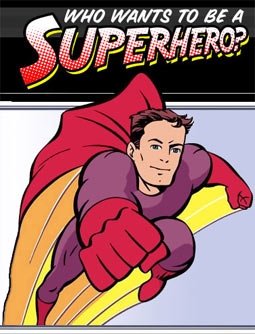
PR.com: The last project I wanted to ask you about is Who Wants to be a Superhero?
Stan Lee: Oh, yes!
PR.com: Is that a reality show?
Stan Lee: It couldn't be any more real than it is. It's going to be a very colorful, and I think, very funny and entertaining show. I believe I'm going to be playing the same type of role as Donald Trump. But instead of saying, "You're fired," I imagine at the end of every episode I'll say something like, "Turn in your costume."
PR.com: Or, "Turn in your cape", or something…
Stan Lee: Yeah, turn in your cape. I'm going to have to remember that.
PR.com: How did you come up with the name POW! Entertainment?
Stan Lee: I like names. When I was with Marvel, the first club that I formed there, I called it the M-M-M-S - The Merry Marvel Marching Society. And I created a character called Nick Fury, Agent of Shield. And S-H-I-E-L-D stood for Supreme Headquarters International Law Enforcement Department, or Division. So when I was looking for a name here, I wanted letters that would stand for something and also look good. So I thought of P-O-W, exclamation point. And I'm sure you've already figured out that it stands for Purveyors of Wonder.
PR.com: Where do you see POW! Entertainment taking your career? Or where do you see this journey taking you over the next several years?
Stan Lee: I don't want to sound too optimistic, but I understand that Warner Brothers, Universal, and Paramount are all getting pretty worried as they watch our progress. (Laughs) No, I'm only kidding. I hope we become a very respectable, reputable and successful company in entertainment, providing the public with unusual, colorful and exciting motion pictures, television shows, DVD's, mobisodes, video games, and anything in the field of entertainment. [It will] be based on colorful characters and off-beat stories, usually with high concept stories. We want to be in that arena.
PR.com: Let's talk about the cell phones, the downloadable episodes. What are they called, mobisodes?
Stan Lee: Well, we've called the episodes that will be on the cell phones "mobisodes." That's taken from mobile phone episodes, so it's mobisodes. Gill [Champion] made up that word.
PR.com: And this is content that you can get through any wireless service provider?
Stan Lee: That's right, but it's not here yet. We're going to be doing these little episodes that will be 3-4 minutes long in animation. Some are strictly comedy, some are adventure stories, and you'll be able to download them onto your [cell] phone. Here in this country, most people in the street, you see them walking around with telephones to their ears. In Asia where these [cell phone downloadable episodes] have already become very big, almost everybody is walking around holding the telephone in front of them, looking at the little screen and they're all bumping into each other! It will be coming to the United States by the end of the year, and it's going to be a very big thing.
PR.com: That's awesome.
Stan Lee: Yeah, it really is; and I'm glad we're right there at the start of it.
PR.com: So POW! Entertainment is embracing technology and new forms of media.
Stan Lee: I am the least technically oriented person in the world. Luckily, Gill is technically oriented and all the people we work with are. All I've got to do is write the stuff and they figure out how to put it together. So it works out just great.
PR.com: So you're a good team.
Stan Lee: I think so.
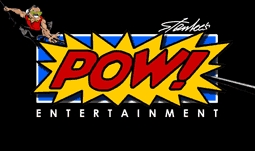
PR.com: By the way, I have to tell you, I'm terrible with sarcasm. So when you have a sarcastic sense of humor… it goes right over my head, if you didn't notice…
Stan Lee: (Laughs) That's funny in itself.
To learn more about POW! Entertainment, visit www.powentertainment.com.
For information on POW! Entertainment's stock, news can be found in the
finance section of most major search engines. Trading symbol: POWN.
